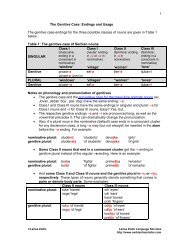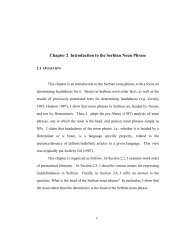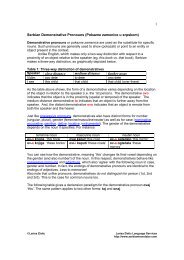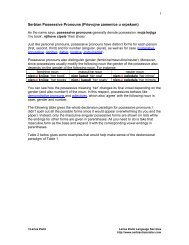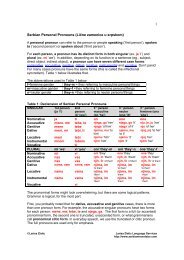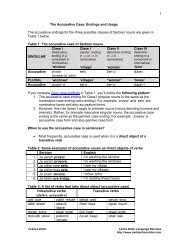The Instrumental Case: Endings and Usage The instrumental case ...
The Instrumental Case: Endings and Usage The instrumental case ...
The Instrumental Case: Endings and Usage The instrumental case ...
Create successful ePaper yourself
Turn your PDF publications into a flip-book with our unique Google optimized e-Paper software.
<strong>The</strong> <strong>Instrumental</strong> <strong>Case</strong>: <strong>Endings</strong> <strong>and</strong> <strong>Usage</strong><br />
<strong>The</strong> <strong>instrumental</strong> <strong>case</strong> endings for the three possible classes of Serbian nouns are given<br />
in Table 1 below.<br />
Table 1: <strong>The</strong> <strong>instrumental</strong> <strong>case</strong> of Serbian nouns<br />
SINGULAR<br />
Class I<br />
(masculine:<br />
ending in a<br />
consonant in<br />
nominative)<br />
‘window’<br />
Class I<br />
(neuter: ending<br />
in –o or –e in<br />
nominative)<br />
‘village’<br />
Class II<br />
(feminine: ending<br />
in -a in<br />
nominative)<br />
‘woman’<br />
Class III<br />
(feminine:<br />
ending in a<br />
consonant in<br />
nominative)<br />
‘love’<br />
<strong>Instrumental</strong> prozor-om sel-om žen-om ljubav-i (or-ju)*<br />
PLURAL ‘windows’ ‘villages’ “women” ‘loves’<br />
<strong>Instrumental</strong> prozor–ima sel-ima žen-ama ljubav-ima<br />
*With Class III singular nouns, the -i ending generally occurs when the noun is modified: sa<br />
jednom ljubavi ‘with one love’, while the -ju ending occurs with unmodified nouns: sa ljubavi ‘with<br />
love’ (see Table 8 below for declination of this Class of nouns).<br />
Please note that the <strong>instrumental</strong> <strong>case</strong> endings in plural, are the same as the plural<br />
dative <strong>and</strong> locative <strong>case</strong> endings. So, you can memorize the endings for one <strong>case</strong> <strong>and</strong><br />
you’ll automatically know the ending for two more <strong>case</strong>s!<br />
When to use the <strong>instrumental</strong> <strong>case</strong> in sentences?<br />
As the name suggests, the <strong>instrumental</strong> <strong>case</strong> is used to show an instrument or means<br />
with which an action denoted by the verb is performed. <strong>The</strong> following verbs take the<br />
<strong>instrumental</strong> <strong>case</strong> as their objects.<br />
Table 2: A list of verbs that take an object in <strong>instrumental</strong> <strong>case</strong><br />
Transitive verbs ‘se’ verbs<br />
‘častiti’ ‘treat’ baviti se ‘pursue, deal, work’<br />
drmati ‘shake’ hvaliti se ‘brag’<br />
mahati ‘wave, flutter koristiti se ‘use’<br />
kolutati ‘roll’ odlikovati se ‘distinguish’<br />
lutati ‘w<strong>and</strong>er’ oduševiti se ‘to impress, delight’<br />
’nuditi ‘offer’ pokriti se ‘cover oneself’<br />
raspolagati ‘despose’ poslužiti se ‘help oneself’<br />
rukovati ‘h<strong>and</strong>le’<br />
snabdeti ‘provide, equip’<br />
škripati ‘grind, squeak’<br />
upravljati ‘manage’<br />
vladati ‘use, conduct’<br />
©Larisa Zlatic Larisa Zlatic Language Services<br />
http://www.serbiantranslator.com<br />
1
Table 3: Some examples of <strong>instrumental</strong> nouns as objects of verbs<br />
Serbian English<br />
1. Marija je častila Zorana pićem. Marija treated Zoran to a drink.<br />
2. Jovan je mahao rukom. John waved (with) his h<strong>and</strong>.<br />
3. On je kolutao očima. He rolled(his eyes.<br />
4. Zorica škripi zubima noću. Zorica grinds her teeth at night.<br />
5. Direktor upravlja dobro<br />
<strong>The</strong> director manages his company<br />
preduzećem.<br />
well.<br />
6. Ona dobro vlada engleskim. She uses her English well.<br />
7. Danko se hvali svojim kolima. Danko brags about his car.<br />
8. Ona se poslužila kolačima. She helped herself to the cakes.<br />
9. Marko se pokrio ćebetom. Marko covered himself with a blanket.<br />
<strong>The</strong> <strong>instrumental</strong> <strong>case</strong> also appears with many other (not necessarily transitive) verbs to<br />
express the idea ‘by means of’ (examples 1-4). Also, the <strong>instrumental</strong> <strong>case</strong> occurs in<br />
certain time expressions (examples 5-6).<br />
Table 4: Some examples of <strong>instrumental</strong> nouns with other verbs<br />
Serbian English<br />
1. Oni su putovali avionom. <strong>The</strong>y traveled by plane.<br />
2. Ona je došla vozom. She came by train.<br />
3. Marija šeta glavnom ulicom. Maria is strolling down the main<br />
street.<br />
4. Milan je ubijen nožem. Milan was killed by a knife.<br />
5. Marija hoda satima. Maria walks for hours.<br />
6. Ona je čekala Jovana danima. She spent days waiting for Jovan.<br />
<strong>The</strong> <strong>instrumental</strong> <strong>case</strong> is also used as an object of some prepositions<br />
• <strong>The</strong> most frequent preposition that requires <strong>instrumental</strong> <strong>case</strong> is s(a) ‘with’. <strong>The</strong><br />
basic meaning is ‘with, accompanying.’ Note that the format s(a) is a shorth<strong>and</strong><br />
for two possibilities: sa or s.<br />
<strong>The</strong> full form sa is used when the word that follows begins with a similar<br />
sounding consonant: s, š, z, ž, č, dž (e.g., sa Suzanom ‘with Susan’, sa<br />
Zvonkom ‘with Zvonko’, sa životom ‘with life’).<br />
<strong>The</strong> short form s is used in all other contexts, including when the word that<br />
follows begins with a vowel (e.g., s Anom ‘with Anna’), although sometimes<br />
people use the full sa form here as well.<br />
Note that the preposition ‘sa’ also occurs with the genitive <strong>case</strong>, but has quite<br />
different meaning then.<br />
©Larisa Zlatic Larisa Zlatic Language Services<br />
http://www.serbiantranslator.com<br />
2
Table 4: Some examples of the <strong>instrumental</strong> <strong>case</strong> as the object of preposition sa<br />
Serbian English<br />
1. Ona se posvađala s profesorom. She quarreled with her professor.<br />
2. Ona se ne slaže s tom politikom. She doesn’t agree with those politics.<br />
3. Director je razgovarao s radnicima. <strong>The</strong> director talked with the workers.<br />
4. Ona je putovala sa drugaricom. She traveled with her girlfriend.<br />
5. On nije zadovoljan s novim kolima.** He is not satisfied with his new car.<br />
6. On nije zadovoljan s tobom.** He is not satisfied with you.<br />
7. On nije zadovoljan svojim uspehom.** He is not satisfied with his success.<br />
**Note that in examples 5-7, the adjective zadovoljan can take the <strong>instrumental</strong> noun<br />
with (ex. 5, 6) or without (ex. 7) the preposition s(a). <strong>The</strong>re is a tendency not to use the<br />
preposition s(a) when the noun denotes an abstract object, as in example 7 above.<br />
Also, there is a tendency to use the preposition s(a) when the <strong>instrumental</strong> noun denotes<br />
a human being, as in example 6. This is just a tendency, not a strict rule.<br />
• Another preposition that requires the <strong>instrumental</strong> <strong>case</strong> is the preposition za<br />
‘behind, at, after, during’. With this preposition, the <strong>instrumental</strong> carries various<br />
meanings: a) a place that is behind or around something (examples 1-2); b) to<br />
show that the object in <strong>instrumental</strong> <strong>case</strong> is in front of the subject of the sentence<br />
(example 3); c) time duration (example 4).<br />
Note that the preposition za also occurs with the accusative <strong>and</strong> genitive <strong>case</strong>s,<br />
but has different meaning then.<br />
Table 5: Some examples of the <strong>instrumental</strong> noun as the object of preposition za<br />
Serbian English<br />
4. Devojčica stoji za uglom. <strong>The</strong> girl is st<strong>and</strong>ing behind the corner.<br />
5. Cela porodica sedi za stolom. <strong>The</strong> whole family is sitting at the table.<br />
6. Dečak trči za loptom. <strong>The</strong> boy is running after the ball.<br />
7. Za ručkom niko ne govori. During lunch, nobody talks.<br />
• <strong>The</strong> following prepositions also take the <strong>instrumental</strong> <strong>case</strong>: među ‘among’, nad<br />
‘above, over’, pod ‘under’, pred ‘in front of’. When used with these prepositions,<br />
the <strong>instrumental</strong> <strong>case</strong> indicates the location of the action or state expressed<br />
by the verb. Some examples are shown in Table 6 below.<br />
Note that these prepositions also occur with the accusative <strong>case</strong>, but have<br />
different meaning then (show a destination or goal of the movement or action<br />
expressed by a verb)<br />
For a more comprehensive list of prepositions, see the file Serbian prepositions<br />
<strong>and</strong> their <strong>case</strong>s.<br />
©Larisa Zlatic Larisa Zlatic Language Services<br />
http://www.serbiantranslator.com<br />
3
Table 6: Some examples of the <strong>instrumental</strong> noun as the object of prepositions<br />
1. Serbian English<br />
2. Devojčica sedi među dečacima. <strong>The</strong> girl is sitting among the boys.<br />
3. Kiša se sručila nad gradom. <strong>The</strong> rain poured over the city.<br />
4. Mirko spava pod drvetom. Mirko is sleeping under the tree.<br />
5. Dragan čekao pred kućom. Dragan waited in front of the house.<br />
To ask questions about the <strong>instrumental</strong> <strong>case</strong>, we use the following interrogative<br />
pronouns in the <strong>instrumental</strong> <strong>case</strong>.<br />
Sa kime ‘with whom’ Sa čime ‘with what’<br />
Note that the preposition sa sometimes is not necessary, depending on the verb. <strong>The</strong><br />
vowel ‘e’ in ‘kime’ <strong>and</strong> ‘čime’ is also optional.<br />
Table 7: Some examples of questions that ask about the <strong>instrumental</strong> object<br />
Serbian English<br />
Question: Sa kime si šetala?<br />
With whom did you walk?<br />
Answer: Šetala sam s Marijom.<br />
I walked with Maria.<br />
Quesiton: Čime si putovala?<br />
With what did you travel (=How did<br />
Answer: Putovala sam vozom.<br />
you travel)?<br />
I traveled by train.<br />
Quesiton: Sa čime si zadovoljan?<br />
With what are you satisfied?<br />
Answer: Zadovoljan sam s novom kućom. I’m satisfied with the new house.<br />
<strong>The</strong> <strong>instrumental</strong> ending –i <strong>and</strong> -ju for Class III nouns<br />
As mentioned in a footnote for Table1, Class III singular nouns have two endings: -i or –<br />
ju.<br />
<strong>The</strong> -i ending generally occurs when the noun is modified, as in: sa jednom ljubavi ‘with<br />
one love’, while -ju ending occurs with unmodified nouns, as in: sa ljubavi ‘with love’.<br />
<strong>The</strong> table below shows the –ju ending for various nouns belonging to Class III. Note that<br />
the sound –j (pronounced ‘y’) undergoes some phonological changes due to a general<br />
phonological rule of consonant ‘softening’ or palatalization. Don’t panic! It’ll make<br />
sense with practice.<br />
Table 8: <strong>The</strong> <strong>instrumental</strong>, singular ending ‘-ju for Class III nouns<br />
1. glad + ju = glađu ‘hanger’<br />
5. kćer + ju = kćerju<br />
‘daughter’<br />
2. jesen + ju = jesenju ‘autumn’ 6. pomoć + ju = pomoću<br />
(here.<br />
‘help’<br />
žeđ + ju = žeđu ‘thirst’<br />
3. ljubav + ju = ljubavlju ‘love’<br />
krv + ju = krvlju ‘blood’<br />
7. sol + ju = solju ‘salt’<br />
4. bolest + ju = bolešću ‘illness’<br />
mladost + ju = mladošću ‘youth’<br />
8. stvar + ju = stvarju ‘thing’<br />
Explanations of sound changes (for details see Phonological rules)<br />
In 1. d +j = đ by a general rule of palatalization or consonant softening.<br />
©Larisa Zlatic Larisa Zlatic Language Services<br />
http://www.serbiantranslator.com<br />
4
In 2. nothing happens in writing, but in pronunciation, the sound nj is a single sound,<br />
pronounced as n in the Spanish word pinata.<br />
In 3. we have this rule: v+j=vlj.<br />
In 4. we have two phonological rules: t+j = ć to get: bolesću. <strong>The</strong>n, we have a<br />
phonological rule of place assimilation, where s before the palatal sound ć, becomes a<br />
palatal sound š. Or to put it in terms of a mathematical formula: s+ć = šć. Don’t panic!<br />
<strong>The</strong>se are general phonological rules that happen across the entire language, <strong>and</strong> you’ll<br />
eventually learn them by practicing.<br />
In 6. we have two deletion rules: ć+j=ć <strong>and</strong> đ+j=đ.<br />
In 7. nothing happens in writing, but in pronunciation, the sound lj is a single palatal<br />
sound, pronounced lj.<br />
In 8, nothing happens.<br />
©Larisa Zlatic Larisa Zlatic Language Services<br />
http://www.serbiantranslator.com<br />
5
And now some exercises! If you get stuck or are not sure whether you got it right, please<br />
email me for help.<br />
Exercise 1 – Fill out the <strong>instrumental</strong> <strong>case</strong> forms in sentences below<br />
Using the nouns below (given in nominative, or dictionary form), please insert the<br />
appropriate <strong>instrumental</strong> forms in the following sentences. For convenience, I have<br />
indicated which noun goes with which sentence.<br />
1. Zorica (female name) 4. dani ‘days’ 7. voz ‘train’<br />
2. sport ‘sport’, godina ‘year’ 5. majka ‘mother’ 8. prodavnica ‘store’<br />
3. muzika ‘music’ 6. računar ‘computer’ 9. krevet ‘bed’<br />
10. zmaj ‘kite’<br />
1. Razgovaram sa____________ I’m talking to Zorica.<br />
2. Milan se bavi _______ _________ Milan has been doing sports.for years.<br />
3. Marija se ne bavi______________ Marija is not doing music.<br />
4. Ona je čekala_____________ She was waiting for days<br />
5. Idem sa _______ na pijacu. I’m going with my mother to the market.<br />
6. Danko sedi za ________ Danko is sitting at the computer.<br />
7. Milan putuje ________ do mora. Milan is traveling by train to the seacoast.<br />
8. Zorica čeka Milana pred __________ Zorica is waiting for Milan in front of the store<br />
9. Marija se krije pod _________ Marija is hiding under the bed.<br />
10. Devojčica trči za ___________ <strong>The</strong> girs is running after the kite.<br />
Exercise 2 – Translate the following sentences<br />
For this exercise you need to know both the present tense <strong>and</strong> past tense. <strong>The</strong> boldface<br />
nouns require the <strong>instrumental</strong> <strong>case</strong>. If you don’t have a bi-directional Serbian-<br />
English-Serbian dictionary, you may go to the website:<br />
http://www.krstarica.com/dictionary/ to get the words you need for this exercise. Note<br />
that for nouns, a dictionary will only give you the nominative <strong>case</strong> forms.<br />
1. Today, I’m walking with Jovan.<br />
2. <strong>The</strong>y are traveling by boat.<br />
3. Zorica cut the meat with a knife.<br />
4. She is managing the company.<br />
5. Sanja is doing skiing.<br />
6. <strong>The</strong>y waited in front of the post-office.<br />
7. Mary is st<strong>and</strong>ing in front of the doorway.<br />
8. He is sleeping under the bush.<br />
©Larisa Zlatic Larisa Zlatic Language Services<br />
http://www.serbiantranslator.com<br />
6



